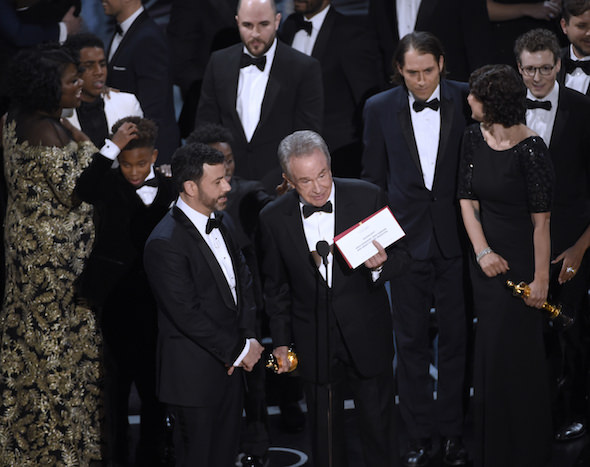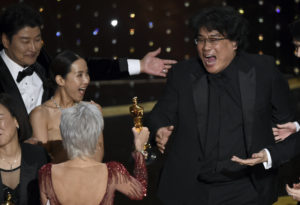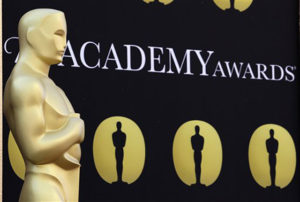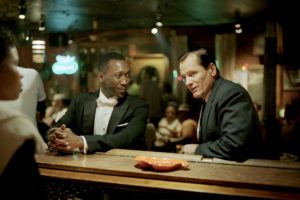That Final Twist Was More Surprising Than the Politics at the 2017 Oscars
Contemporary actors, including a few at Sunday's Academy Awards, might catch heat for mixing politics with gold statuettes, but politics are in Oscar’s DNA.
Warren Beatty (center), Oscar host Jimmy Kimmel (center left) and cast members and producers from “Moonlight” and “La La Land” shared the stage after Beatty’s best-picture gaffe. (Chris Pizzello / Invision / AP)
“Remember last year when it seemed like the Oscars were racist?” asked this year’s host, Jimmy Kimmel, referring to 2016’s #OscarsSoWhite controversy, in his opening monologue at Sunday’s Academy Awards. “That’s gone. Thanks to him [President Trump].”
Kimmel tweaked the presidential administration with six direct cracks, including asking Meryl Streep if her spangly teal gown was designed by Ivanka Trump and riffing that the show was being watched “around the world in more than 225 countries that now hate us.”
For the most part, the acceptance speeches were obliquely political, like that of Barry Jenkins, director and co-writer of “Moonlight,” which won three Oscars, including best picture. When Jenkins accepted adapted-screenplay honors—along with co-writer Tarell Alvin McCraney—for the big-screen version of McCraney’s play about a young black man struggling with his homosexuality, he assured those from marginalized backgrounds that he and the American Civil Liberties Union have their backs and that he would hold up a mirror to their lives.
The most pointed commentaries came from an actor and a director who are foreign-born.
Before listing the contenders for best feature animation, presenter Gael García Bernal acknowledged the many foreign nominees, declaring, “As a Mexican, as a Latin American, as a migrant worker, as a human being, I’m against any form of wall that wants to separate us.”
The most political speech of the evening was not delivered in person. Asghar Farhadi, the gifted Iranian filmmaker who won an Oscar for “The Salesman,” boycotted the ceremony, sending a proxy to read this statement: “My absence is out of respect for the people of my country and those of six other nations who have been disrespected by the inhumane law that bans entry of immigrants to the U.S.”
Yes, speeches, speeches, a lot of speeches at the 2017 Oscars, confirming the predictions of pundits that the ceremony would give Hollywood celebrities a platform for their political beliefs—as if this were unusual.
Politics are in Oscar’s DNA. The Academy of Motion Picture Arts and Sciences was conceived by Republican studio moguls to pre-empt unionization by their workers.
Wendell Willkie, a Republican who ran for the U.S. presidency in 1940, appeared at the ceremony in 1942, prompting Bob Hope, the host and a proud Republican, to flash his Willkie for President button. In 1975, producer Bert Schneider accepted the best-documentary Oscar for “Hearts and Minds,” a film deeply critical of the Vietnam War, reading a cable from the Viet Cong delegation. And in 2003, Michael Moore, best-documentary winner for “Bowling for Columbine,” chastised President George W. Bush for pushing the United States into war in Iraq.
And then there was Jane Fonda, who won the best-actress award for “Klute” in 1972 and accepted her statuette by saying, “There’s a lot to be said tonight, but I won’t say it.”
Much of Sunday night’s political commentary was nonverbal: Lin-Manuel Miranda, like many attendees, wore a blue ribbon honoring the ACLU. Best-actress Oscar winner Emma Stone accessorized with a “PPact” pin honoring Planned Parenthood.
Perhaps the most potent political commentary came in the form of a New York Times television commercial that ended with the words “truth is hard to find.”
The evening concluded with presenter Warren Beatty, who once nursed political ambitions, observing, “The goal of politics is the same as [the actor’s] goal: to get to the truth.” Beatty and co-presenter Faye Dunaway then accidentally announced that the best-picture trophy was going to “La La Land.” The mistake was corrected, and the producers of the night’s true winner, “Moonlight,” took the stage in one of the Oscars’ oddest twist endings—proving once again that truth needs to be fact-checked.
Independent journalism is under threat and overshadowed by heavily funded mainstream media.
You can help level the playing field. Become a member.
Your tax-deductible contribution keeps us digging beneath the headlines to give you thought-provoking, investigative reporting and analysis that unearths what's really happening- without compromise.
Give today to support our courageous, independent journalists.






You need to be a supporter to comment.
There are currently no responses to this article.
Be the first to respond.